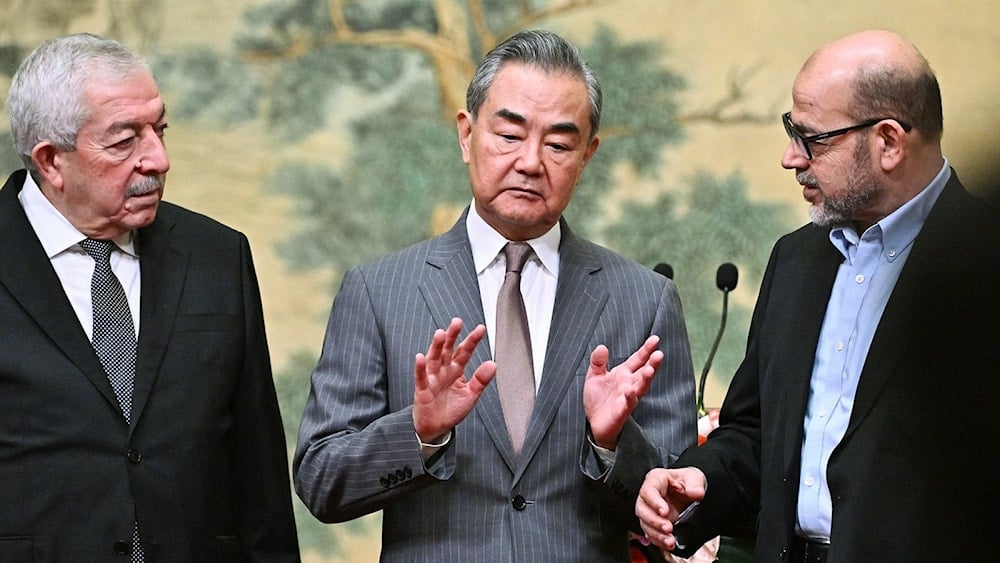Hamas-Fatah talks in Cairo yielded no results over Gaza governance
The Cairo meetings aimed to discuss the Israeli aggression on Gaza and the political and field developments in the Palestinian enclave.
-

Mahmoud Al-Aloul, Vice Chairman of the Central Committee of Fatah, China’s Foreign Minister Wang Yi, and Moussa Abou Marzuk, senior member of Hamas, attend an event in Beijing on July 23, 2024. (AFP)
The meetings between the Hamas and the Fatah movements in Cairo have not yet resulted in a final agreement regarding the governance of the Gaza Strip, a Palestinian source told Al Mayadeen on Wednesday.
The source explained that Hamas insists on forming the administration through "national consensus and the formation of a unity government," while Fatah remains committed to Mohammad Mustafa's government as a base for talks during the Cairo meetings.
Both Hamas and Fatah held a meeting in Cairo earlier on Wednesday to "unify efforts and the national front," with the Hamas delegation led by Political Bureau member Khalil al-Hayya and the Fatah delegation led by its Deputy Chairman, Mahmoud al-Aloul.
The media advisor to the head of Hamas' Political Bureau said that these meetings aim to discuss the aggression on Gaza and the political and field developments, as well as to review the work mechanism of the committee responsible for managing crossings, along with health, relief, shelter, social development, and education issues.
It is noteworthy that in July, 14 Palestinian factions signed an agreement in the Chinese capital Beijing to set up an "interim national reconciliation government" to govern the emergency situation that followed the Israeli occupation's genocidal war on the Gaza Strip and the increased pressure and tensions across the West Bank.
Al Mayadeen obtained a copy of what was referred to as the Beijing Declaration, in which the factions promised to "end the Palestinian national division" and to "unify national efforts to confront the [Israeli] aggression and stop the genocide."
According to the document obtained by Al Mayadeen, Palestinian factions will monitor the implementation of the agreement's clauses "with the help of Egypt, Algeria, China, and Russia."
The declaration also stresses a "commitment to the establishment of an independent Palestinian state with al-Quds as its capital," which will be implemented as per international resolutions 181 and 2334.
It also underlined the Palestinian people's right to resist occupation and to end it in accordance with international law, the United Nations Charter, and the right of all peoples to self-determination.
In detail, the participants agreed to form a temporary national unity government after the approval of Palestinian factions and the president of the Palestinian Authority.
This government will exercise its authority "over all Palestinian territories", including the West Bank, al-Quds, and the Gaza Strip, ending years of division.
Those present at the high-level meeting in Beijing also agreed to activate the Unified Temporary Leadership Framework and ensure it meets regularly.
The parties will also work on lifting "the brutal siege on [the Palestinian] people in Gaza and the West Bank and deliver humanitarian and medical aid without restrictions."
They also said that they would "confront conspiracies of the [Israeli] occupation and its continuous violations against Al-Aqsa Mosque, and resist any harm to it and the city of al-Quds and its sanctities."

 3 Min Read
3 Min Read








